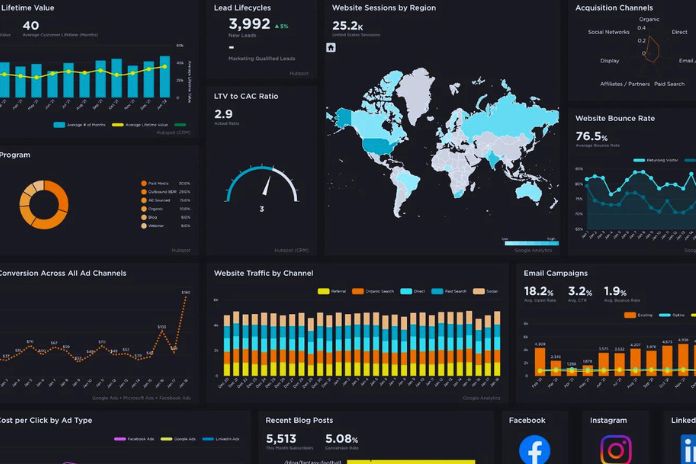The Age of Technology has brought several new ways of communication, which spread knowledge efficiently and make it the competitive differentiator of organizations. With this dissemination promoted by countless technologies, it is increasingly easier to access information. That’s why managers need to know answers to questions like “what is GIS?” and “What is BI?”.
These names are linked to aggregating only the data essential to the company to transform it into helpful information for the organization. This allows the company to develop competitive strategies based on well-structured and organized data.
In other words, when well applied, BI allows complete data analysis, transforming it into knowledge for the company. From this, the company can boost its sales and, at the same time, increase its productivity.
Do you want to know more about business intelligence and what GIS is? So continue reading!
What Is Business Intelligence?
Business intelligence (or market intelligence) is a tool to obtain information through data. Therefore, it is possible to use them to optimize decision-making within the company.
In summary, BI is a set of methodologies, resources and techniques that aim to analyze, collect, process and share information obtained through data entered into systems such as ERP, CRM or Data Mining.
How Does Business Intelligence Work?
BI allows the organization to understand its present and predict the future. This tool simultaneously refers to a concept and an application: it is essential to collect, organize and analyze data, and it is also crucial to be processed analytically to generate strategic information.
By combining all the data, BI compares the information so that only those that add value to the company’s processes are extracted. This optimizes project management and increases the effectiveness of the activities carried out.
With the large amount of data processed by companies, collecting and analyzing it manually would be a procedure that would take years. Therefore, it has become essential to have software to do this work automated, integrating data into a single platform, relating them and generating information that creates new business opportunities.
It is worth mentioning that the information generated by business intelligence is not limited to the company but extends to the market in general — it can refer to consumers, competitors and suppliers. With this tool, it is possible to anticipate fluctuations in demand or changes in consumer profiles, which allows companies to plan their actions and adapt to such transformations.
BI technologies can support many unstructured data from external and internal sources. They interpret these variables with surprising speed and precision, providing managerial intelligence to the business.
Despite being initially used in the strategic scope, BI is already being used at other company levels, such as tactical and administrative, for numerous tasks — such as organizing activities, identifying flaws in the production process, expansion plans and marketing strategies.
What Are The Benefits Of BI For My Company?
Now that you know what business intelligence is, we will show you some advantages to further convince you of the importance of implementing this system in your company. Follow along!
Aid For Decision-Making
As it works with cause and effect relationships — through algorithms, combinatorial analysis and mathematical tools — business intelligence combines external data with internal variables, providing a basis for decision-making, as the analysis of the current situation of the company, as well as predictions for the future.
Therefore, strategic actions developed with BI do not start from a subjective idea but from data aligned with the organization’s reality and the interests of consumers. With a more profound knowledge of the market where the business operates, it becomes even easier to make coherent decisions.
More Efficient Procedures
BI data analysis touches on the company’s internal processes — from operational to senior management decisions. This way, reviewing all procedures is possible, eliminating redundant steps and errors that lead to rework.
Furthermore, business intelligence allows for better management planning, as this tool works optimally, facilitating the use of data that is genuinely relevant to the organization’s activities. This way, the manager understands how his business works, planning everything more effectively, as it is based on solid research and statistical analysis.
Greater Financial Control
With decision-making based on solid information, the company not only improves its procedures. As levels of excellence are achieved with integrated processes, the organization also has better control of its revenues and expenses, gaining a privileged financial view.
By integrating financial and accounting data (such as cash flow, stock information and asset changes), the manager now has a complete view of business capital, knowing the company’s financial health and developing strategies to manage these resources better.
Speed In Data Analysis
BI’s technology and high data storage and processing capacity enable management information to be easily obtained. The speed of these procedures is ideal for the corporate world, which needs to make decisions quickly but with a perfect basis so that they are coherent.
Minimized Risks
As BI generates concrete and organized information, risks can be predicted, avoiding future problems that could create headaches for the manager. With this tool, previously subjective information gives rise to concrete, organized and valuable data for the company, allowing relevant predictions and reducing errors.
And that’s not all: BI aggregates information from all company sectors, merging it with performance data. Thus, it is also possible to analyze employee performance, identifying where the process bottlenecks are and reducing the chances that their errors will be repeated.
Customer Loyalty
With more efficient business management, customer needs can be met coherently. Instead of mass advertising, the company can invest in more targeted advertising, with marketing strategies suited to its target audience.
BI provides concrete and accurate information about customers and their respective needs and preferences, allowing the company to get to know them better and meet their expectations correctly. This way, it is possible to win and retain consumers.
Also Read: Why You Need Business Intelligence In Your Project Management

